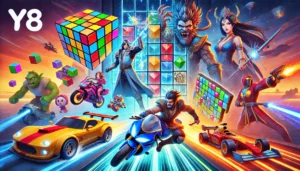GameVerse Insights can exclusively reveal the growing influence and brilliance behind uncommon games, a sector of the gaming world that continues to surprise, innovate, and outperform expectations in creativity. While major studios invest billions in producing blockbuster hits, it’s often the lesser-known titles—crafted by indie developers or small studios—that truly reshape the landscape.
These creative works, often crafted under tight constraints, explore experimental mechanics, bold narratives, and artistic freedom rarely seen in AAA productions. Their rise marks a growing trend in the gaming community, where uniqueness and originality outweigh graphics-heavy sameness.
What Are Uncommon Games?
Unlike the traditional AAA titles backed by major publishers, uncommon games—also known as indie or niche games—thrive on innovation, not repetition. Many of these are passion projects or limited-budget productions that:
- Introduce fresh gameplay mechanics
- Explore unconventional art styles
- Embrace risky, thought-provoking stories
- Deliver unforgettable emotional experiences
Some notable titles include Outer Wilds, Disco Elysium, Hollow Knight, and Papers, Please. These games push past genre boundaries and often end up influencing even the largest development studios.
AAA vs. Indie: A Side-by-Side Look
| Feature | Uncommon Games | AAA Titles |
| Budget | Small, often self-funded | Millions in development & marketing |
| Innovation | High, with experimental gameplay | Lower, often sequel-focused |
| Development Team | Tiny, focused teams | Large teams, multiple departments |
| Risk-taking | Embraces risk and niche themes | Plays it safe to ensure ROI |
| Fan Interaction | Direct, close-knit communities | Broad marketing and PR campaigns |
Why They’re More Creative
Freedom from Stakeholders
Without investor pressure, developers of uncommon games enjoy full creative control—free to innovate without needing mass-market appeal.
Limitations Breed Innovation
Constraints spark originality. Smaller budgets force devs to design smarter, leading to clever mechanics and storytelling.
Direct Community Engagement
With fewer corporate layers, developers maintain stronger ties with fans—adapting and updating games in real time.
Exploration of Deeper Themes
Indie games aren’t afraid to tackle mental health, societal systems, loss, identity, or moral dilemmas.
Exclusive: Uncommon Goods Offers a Creative Game Set
Even retailers like Uncommon Goods are fueling grassroots game development. Their Create Your Own Video Game Set offers budding designers a beginner-friendly tool to spark coding and creativity—perfect for aspiring young devs or curious hobbyists.
Industry Impact: Big Studios Take Note
Some of today’s AAA game features were born from indie ideas:
- Roguelike mechanics → seen in Returnal
- Pixel art styles → embraced by games like Octopath Traveler
- Narrative choice systems → adopted from games like Undertale and Life is Strange
As indie success stories continue to trend, big publishers increasingly look to the uncommon sector for inspiration.
Notable Creative Standouts
| Game Title | Unique Innovation |
| Inscryption | Genre-blending horror deck builder |
| Celeste | Mental health metaphor wrapped in platforming |
| Slay the Spire | Card battler meets roguelike mechanics |
| Journey | Wordless emotional multiplayer experience |
| Baba Is You | Rule-rewriting puzzle logic |
FAQs
1. What defines an uncommon game?
Indie or niche titles with high creative risk and innovation.
2. Are these games successful commercially?
Yes—many generate cult followings and long-term revenue.
3. Why are they more creative?
Less corporate control allows freedom of expression.
4. Are AAA games lacking creativity?
Not completely, but they often favor proven formulas.
5. Can I create my own game easily?
Yes, with kits like Create Your Own Video Game Set and free tools.
6. Where can I find indie games?
Check out Steam, itch.io, and Nintendo’s indie section.
7. Do indie games win awards?
Frequently—Hades, Celeste, and Stray are recent examples.
8. Are these games safe for kids?
Most are—but always check ratings or reviews first.
9. Do they offer multiplayer options?
Yes, many support co-op or online gameplay.
10. Why should I play uncommon games?
To experience fresh ideas, heartfelt stories, and unique designs.

![You are currently viewing Why Uncommon Games Are More Creative Than AAA Titles [EXCLUSIVE]](https://pizles.com/wp-content/uploads/2025/06/Flux_Dev_An_indie_game_developer_sitting_at_a_cluttered_desk_w_3.jpg)


